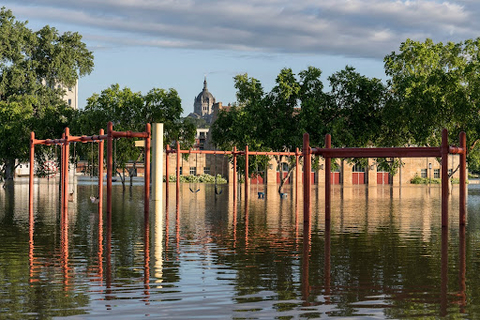Two years ago, Governor Tim Walz announced a new Climate Action Framework for Minnesota, identifying key actions to improve climate resilience across communities.
But one challenge for the state has been how, exactly, to measure resilience — how do we assess how well various adaptation measures are working?
To help answer this question, the University of Minnesota Climate Adaptation Partnership (MCAP) worked with the Minnesota Pollution Control Agency to develop metrics and indicators the state can use to monitor its progress.
“Measuring resilience is not only about the numbers,” said MCAP Associate Director Amanda Farris. “It’s really about the impacts that we see on the ground. And sometimes — in cases where we’re avoiding floods, injury, or other negative consequences — it’s about understanding the impacts that we have avoided.”
MCAP prepared a new report, “Tracking for Impact”, on behalf of the Minnesota Pollution Control Agency and other members of the Resilient Communities Goal Team of the Climate Action Framework. The report represents two years of research and recommendations for the State of Minnesota.
How to measure resilience
MCAP’s recommended resilience metrics include important measures such as the number of current county hazard mitigation plans that include future climate, the amount of state funds allocated to resilience financing, the area of tree canopy statewide, and concentrations of heavy toxins in drinking water.
MCAP also recommended developing new datasets the state can use to improve upon this initial set of metrics and collecting stories about how resilience measures may improve communities or avoid negative impacts.
“With metrics, we can demonstrate the ‘what’ and the ‘how’ of building resilience in Minnesota communities,” said MPCA Climate Change Adaptation Coordinator Sharon Stephens. “We can see how far we’ve come in being more resilient from the impacts of extreme weather and how much more we need to do.”
MCAP is a joint program of University of Minnesota Extension and the College of Food, Agricultural and Natural Resource Sciences. It works with MPCA and the Resilient Communities Climate Action Framework Goal Team to implement the recommendations at the state level and inform monitoring and evaluation efforts by local communities developing their own climate action plans.
Permission is granted to news media to republish our news articles with credit to University of Minnesota Extension. Images also may be republished; please check for specific photographer credits or limited use restrictions in the photo title.


